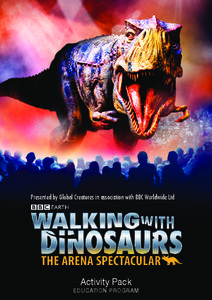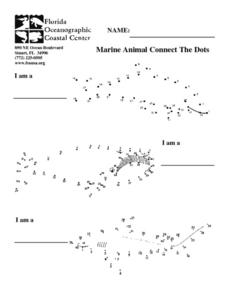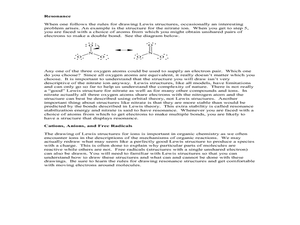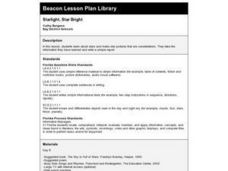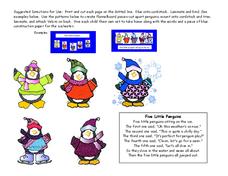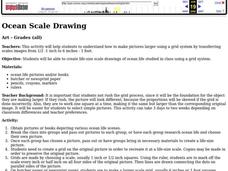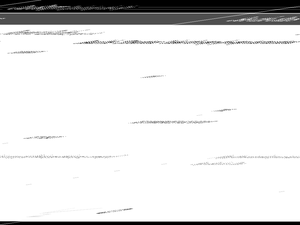Curated OER
Elephant Connect the Dots
In this connect the dots instructional activity, students start at the dot next to the number 1 and then connect the dots all the way up to the number 15 to complete the picture. When the picture is complete, it is an elephant.
BBC
Walking with Dinosaurs
Breath new life into your class's study of dinosaurs with this extensive collection of materials. Offering everything from a printable T-rex mask, word searches, and connect-the-dots activities to informational handouts, hands-on...
Curated OER
Marine Animals Connect the Dots
In this science worksheet, students connect the dots to form 3 different marine animals. Students also write the name of each animal next to its picture.
Curated OER
Connect the Dots: Meerkat
In this connect the dots worksheet, 1st graders will connect numbers 1 to 40 to reveal a picture of a mammal that is often seen standing on its hind legs: a meerkat.
American Museum of Natural History
Cosmic Connection
Do you see what I see? Individuals view eight images from the Hubble Space Telescope and then determine exactly what is being shown in the images. The pictures range from the rings of Saturn to views of billions of galaxies that take up...
Curated OER
Dragonfly Dot To Dot
In this science worksheet, 2nd graders will connect the dots from one to forty-two to create a dragonfly. Students will respond to the question and write what the picture comes to be once it has been completed.
Curated OER
Connect the Dots: Kingfisher
In this animal worksheet, 2nd graders will connect the dots to create a picture. Students will connect from one to thirty-three to create an image of a kingfisher's prey.
Curated OER
Bee Pollen Popular
The world would be a much different place without the help of pollinators. Read about the important role bats, hummingbirds, and various insects play in plant reproduction, exploring the interdependence of living things in an ecosystem....
Curated OER
Alphabet Dot to Dot: Cactus
In this alphabet dot to dot worksheet, students follow the dots from A to Z. Students color the picture of the desert cactus. This is a homemade worksheet.
Baylor College
Bio Build-up
Trace pollutants through the environment in the seventh lesson of this series on the science of food. Looking at a picture of the plants and animals in an aquatic ecosystem, learners use dot stickers to represent harmful chemicals as...
Curated OER
Sky Pictures
Students investigate constellations. In this space science lesson, students view transparencies of constellations and identify the zodiac constellations. Students research the legends connected with the constellations.
Curated OER
Type of Energy - Dot to Dot Puzzles
In this energy instructional activity, students connect the dots to complete pictures of three types of energy that include solar energy, static energy, and stored energy. They color the page and draw other examples of energy in a box at...
Exploratorium
Jacques Cousteau in Seashells
Visionaries create images out of dots to demonstrate the eye-brain connection. Through this activity, they learn that the brain interprets data collected by the eye into recognizable information. Search online for "Jacques Cousteau in...
Curated OER
Sunny Sam Activity Sheet
In these recycling worksheets, students connect the dots and color the 2 pictures for the recycling bins. Students circle items that would be placed in each bin with blue and yellow crayons. Students complete a maze and find 10 things in...
Curated OER
Drawing Lewis Structures
In this drawing Lewis structures worksheet, students read about the 5 steps taken to draw Lewis structures for atoms and molecules. These include identifying the valence electrons, placing pairs of electrons between atoms to be bonded,...
Curated OER
Nature
In these vocabulary acquisition worksheets, students connect the dots for each picture and then write the word for the picture on the lines. In the second worksheet, students connect the dots and fill in the missing letters for each...
Curated OER
Starlight, Star Bright
First graders read books and use the Internet to identify several constellations and stars in the night sky. They make star pictures and write a class report about the night sky including a title, complete sentences and a cited reference.
Curated OER
Fish, Fish: Teaching K Students About Things That Live in the Sea
Students participate in activities designed to help them connect the words to the animals they are studying. Octopus is reinforced through playing a game, "Octopus Tag." Students play a cooperation game of passing bean bags from student...
Orange County Public Schools
Five Little Penguins
Create adorable penguin-themed books and manipulatives with this cool resource. Instructions for use are provided, as are the stars of the show: five warmly dressed penguins who decide to go for a dip.
Curated OER
Ocean Scale Drawing
Students explain how to make pictures larger using a grid system by transferring scales images from 1/2 -1 inch to 6 inches - 1 foot. They create life-size scale drawings of ocean life studied in class using a grid system.
Curated OER
Exploring the Sky: Reading Maria's Comet
Discover the science behind astronomy. After reading the book Maria's Comet, which is about a young woman who breaks new ground by becoming a female astronomer, young learners practice reading comprehension with...
Curated OER
Stars and Constellations-Pattern Recognition
In this stars and constellations worksheet, students study a given constellation and identify the stars in the constellation. They label the stars in the constellation and identify the months the constellation is visible. They research...
Curated OER
See the Stars
Students explore the nighttime sky. For this space science lesson, students read the book Maria's Comet and and investigate the sky using their naked eyes. Students compare the view of their naked eyes to the view of a telescope.
Curated OER
Looking at Food Chains
In this Looking at Food Chains activity, students read about a food chain under the sea and underline important information. Next, students fill in a graphic organizer about food chains based on the information they just read.

